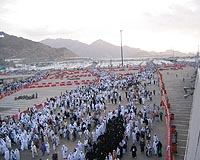| . |  |
. |
Rio De Janeiro (UPI) Nov 11, 2009 Brazilian researchers say they've determined population movement is a key factor in the spread of the dengue virus in Rio de Janeiro. Scientists at the Oswaldo Cruz Foundation said their finding is based on data from a severe 2007-2008 dengue epidemic and contributes a new understanding of the dynamics of dengue fever, a major public health problem in many tropical regions. The disease, transmitted most often by the mosquito Aedes aegypti, is prevalent in tropical areas of Asia and the Americas, with up to 100 million estimated cases occurring annually. The new study combines data on dengue fever seroprevalence -- a test for the disease based on blood serum -- and recent dengue infection and vector density in three neighborhoods of Rio de Janeiro, specifically urban, suburban and slum areas. Blood serum surveys were conducted before and during the epidemic period, with weekly collections of A. aegypti eggs and adults from traps. The scientists said their findings, that suggest significantly higher risk within areas of intense people traffic, might provide a basis for new studies that could further identify the higher risk areas and help to develop dengue-control programs. The research is detailed in the journal PLoS Neglected Tropical Diseases. Share This Article With Planet Earth
Related Links Epidemics on Earth - Bird Flu, HIV/AIDS, Ebola
 Nine hajj flu cases so far: Saudi health minister
Nine hajj flu cases so far: Saudi health ministerRiyadh (AFP) Nov 11, 2009 Nine people out of more than half a million who have arrived for the annual hajj pilgrimage have been diagnosed with swine flu, Saudi Health Minister Dr Abdullah al-Rabeeah said on Wednesday. "The situation from the point of health, we are very happy. Out of the 600,000 arriving so far, we have only seen nine suspected cases of A(H1N1), and only two of those are in the hospital," Rabeeah ... read more |
|
| The content herein, unless otherwise known to be public domain, are Copyright 1995-2009 - SpaceDaily. AFP and UPI Wire Stories are copyright Agence France-Presse and United Press International. ESA Portal Reports are copyright European Space Agency. All NASA sourced material is public domain. Additional copyrights may apply in whole or part to other bona fide parties. Advertising does not imply endorsement,agreement or approval of any opinions, statements or information provided by SpaceDaily on any Web page published or hosted by SpaceDaily. Privacy Statement |